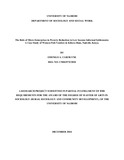| dc.description.abstract | The relationship between informal settlements and poverty may be explained from the
perspective that in most cases poor persons are the ones who live in slum areas, areas that lack
basic facilities. Engagement in micro and small enterprises has been viewed as one of the ways
of alleviating poverty not just in slums but elsewhere as well. Micro-enterprise offers a means for
underserved individuals to work their way out of poverty, contribute to their communities, build
assets and achieve self-sufficiency. The study was conducted to establish the role of Micro
Enterprises in Poverty Reduction in Low Income Informal Settlements: A Case Study of Women
Fish Vendors in Kibera Slum, Nairobi, Kenya.
The study was guided by the following objectives: Establish the reason why fish vending has
become a common activity on income generating activity among poor slum women; find out the
implications the fish vending business has on household incomes; investigate the extent to which
the women fish vendors of Kibera slum are able to meet their basic household and other needs
including food, shelter, clothing, education and medical care and to examine the extent to which
wellbeing may have improved for households belonging to the women fish vendors. The target
population comprised poor women fish vendors and their households in the Kibera slum and its
immediate environs. Kibera is located in southwest Nairobi, roughly 5 kilometers from the city
centre. The slum is divided into 13 villages, including Kianda, Soweto, Gatwekera, Kisumu
Ndogo, Lindi, Laini Saba, Siranga/Undugu, Makina and Mashimoni.
The study targeted a total of 50 respondents. The data was collected using questionnaires and the
interview schedule. The data was analyzed using SPSS. The findings revealed that majority of
the women fish vendors were able to meet their rent expenses from the fish vending activities.
The finding revealed that fish vending among the women con tribute greatly towards
empowering women and subsidies the expenses for the clothing, further the findings revealed
that before fish vending majority of the women were able to access the public health care which
perhaps were predicted by the amount of income that they managed to access. The findings also
revealed that majority of women after getting involved in the fish vending business were able to
access better health facilities, it was revealed that majority of the women fish vendors were able
to manage schooling for their children out of the fish vending activities.
The study concludes that fish vending among the women contribute greatly towards empowering
women and subsidies the expenses for the clothing and that before fish vending majority of the
women were able to access the public health care which perhaps were predicted by the amount of
income that they managed to access. The study recommends that a clear policy on microenterprise
should be developed at a national level, because micro-enterprises have the potential
of alleviating poverty and hence leading the country closer to attaining the goals as envisaged by
vision 2030. | en_US |

